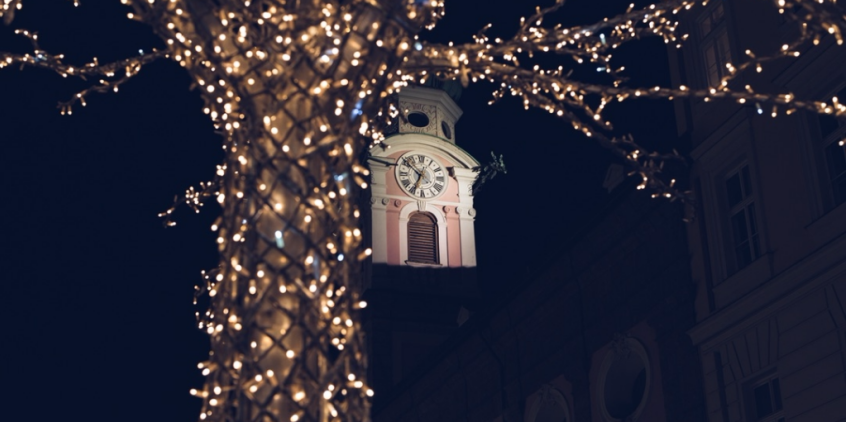
For more than five decades, most years of my life since I was 15 days old, Christmas Day has been a working day. My father was a vicar, and then I went into journalism.
Most churches, in the Church of England at least, open on Christmas Day. Imagine the headlines if they didn't!
And indeed, there has been controversy in the US when churches have in the past cancelled Christmas Day services when the day fell on a Sunday.
The problem is not just the vicar, but all the additional staff and volunteers needed for a normal Sunday service schedule – servers, vergers, church wardens, organists, the choir, tea makers and greeters.
The vicar might be willing to give up his Christmas morning, but it does seem a bit much to demand the same of everyone else.
Angela Tilby, a canon at Christ Church, Oxford, set off renewed debate in the UK with her latest Church Times column.
She wrote: "I think it may be an apocryphal story, but I heard recently of a new curate who expected Christmas Day to be a day off — after all, she said: 'Christmas is family time.' The story is not as unlikely as it might seem. I definitely knew of an ordinand who was horrified to discover that he was expected to attend a 'placement' church during his training, instead of his 'sending' church, where his wife and children worshipped, because 'Sundays are family time'."
The many responses this provoked are summed up helpfully by Ian Paul at Psephizo, who asks whether clergy should expect to have Christmas Day off. And he references the new Church of England Christmas video: "I was intrigued by the presentation of the demands of marriage and family life in the latest Church of England video featuring Kate Bottley. (Was there more than a hint of Vicar of Dibley about it?).
"I don't think it was an accurate portrayal of actual Bottley home life—but the picture was of Kate as busy vicar, mother and wife, trying to juggle ministry, parenting and cooking the Christmas dinner. I wonder how often we are presented with male clergy also struggling with continued demands of domestic life alongside ministry demands?"
This was something we lived with every year in our own family.
A December baby, I accompanied my parents to church as a tiny infant on my first Christmas, when my father was a curate in Loughton, Essex.
In the years after that, I was joined by many siblings and foster siblings until we had the football team our mother always dreamed of, only we preferred reading and riding to soccer.
We never had much money and life and our decrepit Rectory in Gratwich near Uttoxeter was generally chaotic. Windows were frozen shut in the winter, our water came from a well and was not always reliable. Our milk came straight from the cows at the neighbouring farm and was sometimes still steaming warm when it was delivered in an old-fashioned churn on our doorstep.
We were surrounded by animals and stables and lively children. The baby Jesus in the stable was just another annual arrival in the daily miracle of our continued existence.
A highlight of the year was of course Christmas. We never had much money so the appearance of presents under the tree was wonderful beyond imaginings, along with the stocking coins carefully saved over the months by our mother. She also always managed to acquire precious tangerines from somewhere.
And the discipline of Christmas was invaluable in teaching delayed gratification. Our father had not just one but two churches to which we all had to go on Christmas morning. In the smallest, Gratwich, our family was in effect the congregation, apart from the organist and church warden. But the service still took place.
And then we had to peel the potatoes, lay the large round dining table and generally help get things ready for the feast ahead before we could sit down and open those presents. And what a tearing and unwrapping it was.
In adulthood, I preferred Midnight Mass to Christmas Day services. The 25 December was also at first a day off for journalists, but then papers began publishing on Boxing Day so someone had to go into the office to write them. For many years, when I was at The Times, one of those people was me.
After having a baby of my own, I was allowed to work at home on Christmas Day for a few years, writing up the Pope's message, the sermons of the Archbishop of Canterbury and York and sometimes the Queen and her family at Sandringham. But I still worked. I volunteered to work, as it was always voluntary. It was somehow even enjoyable.
Even this year, I'll be going into Sky TV around lunchtime to comment on the Pope and the Archbishop, who will doubtless reflect on the Middle East, perhaps on Brexit, on the need for peace, reconciliation and hope in the new year ahead.
At Sky, there will be security staff, camera people, presenters, researchers, guest-getters, make-up technicians – all working on Christmas Day.
One thing I remember in imbibing the Protestant work ethic through those years of sitting in hard wooden pews in Victorian churches around Jamaica, England and Wales, as my father preached from the pulpit, was that was work was something to be regarded as service.
Of course it is not possible for everyone to be in work, or to have jobs that they like, and certainly not all the time within my own jobs has been enjoyable, or possibly of service to the wider good. But I am so used to working on Christmas Day now, I can't imagine doing anything else.
If I had a family that needed my presence thoughout this particular day, or a different type of job, I might be less sanguine about it. Has my own family paid a price from my absence for so many Christmases? I don't think I'll ever know. But working on Christmas Day is definitely an act of service because for those of us who do it, it means others don't have to.
My father died a few years ago, long retired. Like most "retired" clergy, he worked every Sunday – and every Christmas – almost to the end of his life. I do think The Times had it right. For everyone, even clergy, it should be voluntary. Jesus was after all born in a stable, or maybe a house, but definitely not in a church.













